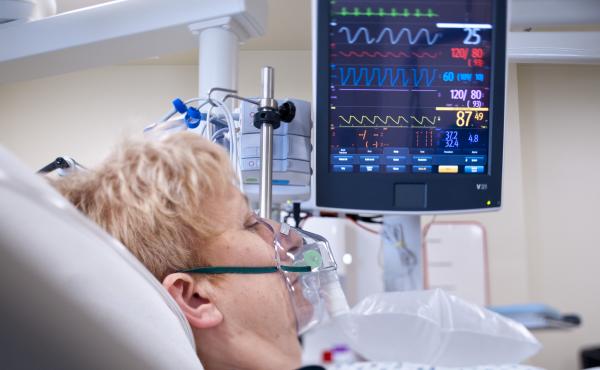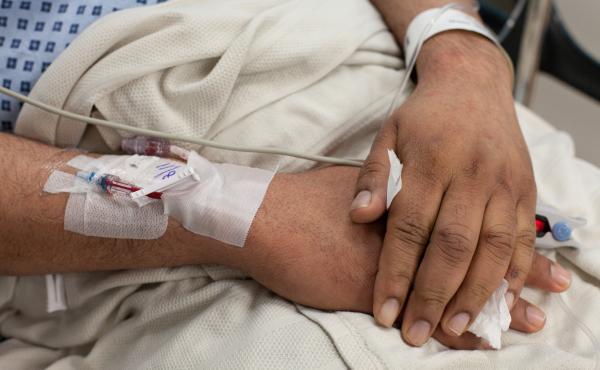Children, Families and Critical Care
Will my family and friends be able to visit me?
Who can my family and friends ask for help if they are worried about me or unhappy about any of the care I am receiving?
Visiting a relative or friend on critical care
Knowing a loved one is in Intensive care is stressful and difficult. Visiting is encouraged as we recognise that this is important for both patients and relatives. A visit from someone in your faith community will also usually be possible. Intensive care units often limit the number of visitors at any one time and there may be set times for visiting, in order to allow patients to rest and recover.
Sometimes, such as during the Coronavirus pandemic, it may not be possible to visit patients in hospitals. However, the Intensive care team will be able to advise you and your family of what we can do to help. If visiting is not possible then voice or video calls can be used to provide updates and support until it is safe to accept visitors once more.
It is normal for you and your relatives to have questions or concerns about your treatment. We would encourage you to discuss any concerns you have about any aspect of your care with the Intensive care team.
Should you have concerns that have either not been addressed or you would prefer not to discuss these directly with the Intensive care team, then we advise you to talk to the Patient Advice and Liaison Service (PALS).
Although sometimes frightening, it is normal to want to be with your relative when they are on critical care. Most units will have a visiting policy, specifying preferred times for visiting and numbers of visitors allowed at the patient’s bedside, however these are a guide and some flexibility exists. Often, staff on critical care will be happy to provide telephone updates if a patient’s condition changes. It is useful to nominate a relative who is responsible for passing this information on to extended family and friends.
We recognise that the health and wellbeing of the relatives of our patients is also very important. You will need to take extra care looking after yourselves. It is not practical to always be at the bedside or in hospital for the duration of a patient’s stay and it is therefore important to spend time away from the critical care unit. You should not feel guilty for not being with your relative all the time. Remember that they will not be alone and you need time to rest, eat and recharge. Likewise you may need to ask for help from others.
At first I would return home after long days at the hospital and would spend 2 or 3 hours replying to messages to update everyone about Matt’s progress. It was exhausting and so in the end I nominated one family member and one friend in each friendship group that I could update and they would then filter the information through to others.
Information for families
If someone close to you is seriously unwell it can be really hard to know the best way to help the children in your family. We hope that the following tips may help in this situation.
Having a loved one in critical care means your child will probably already be aware that something is wrong. Whilst it will be hard for you to tell your child what is happening, it is normally better that they hear this information for the first time from you rather than from someone else. Having said this, our staff can help advise you and be present if you choose.
Sharing this information with children will help them to feel involved and not knowing may make them feel more anxious or confused.
What you say to your child will depend on their age and understanding. Start by letting them know that you have something serious to talk to them about. Tell them in simple words that their loved one is in a special place in the hospital for people who are very seriously unwell called ‘critical care.’ Tell them that the doctors and nurses and medical equipment are to try to make them better.
Children should be encouraged to ask questions. In this way they may guide you with what else they want to know.
Giving updates
Children should be given regular updates when appropriate. It can be reassuring if the child is told that as soon as you know you will tell them. However, as critically ill patient’s conditions can change rapidly you may not want to give them hour-by-hour updates.
It may be helpful to encourage your child to keep a diary. This may help the child understand what is happening and make it easier for them to talk to their relative about what happened in their own life whilst their relative was in hospital.
Informing the child’s school is important and the child should be told that it is okay for them to talk to friends, teachers and family about what is happening, unless there is a specific reason not to.
Try to keep your child’s routine as much as possible whilst their relative is in critical care. It is also important to remember that mixed feelings are normal and that at times they may feel upset, worried, angry, guilty or happy.
You may need to consider whether your child should visit their parent or close relative in the critical care unit. You should check with the staff before bringing children into the unit and also talk to the child about it before you come in.
There is a book available on the ICU steps website which may help prepare a child for a visit.
Talking to friends and family
Lastly, it is okay for the child to see that you are upset. It may even be helpful for them seeing you express emotions. However if you feel overwhelmed by your emotions most of the time it may be distressing for the child to see that. Try to talk to your friends and family about how you feel and also to members of staff on the critical care unit who may be able to advise you about where to find additional support for yourself and your family during this difficult time.



